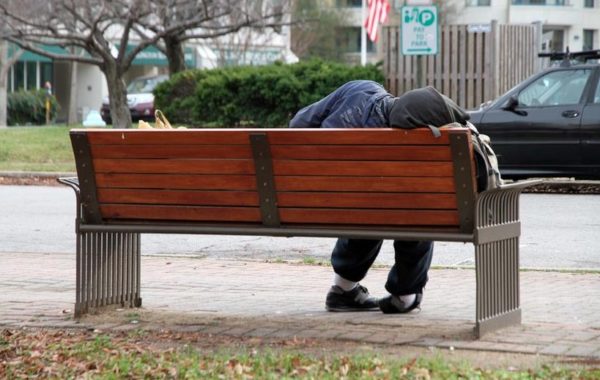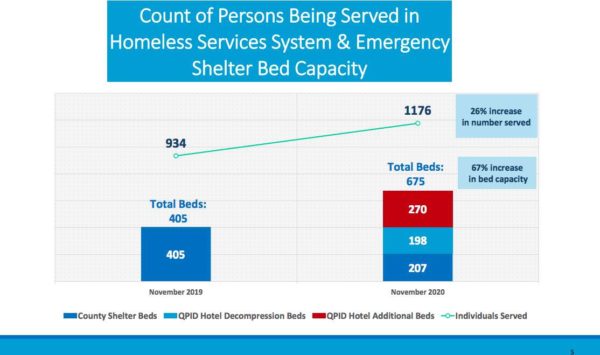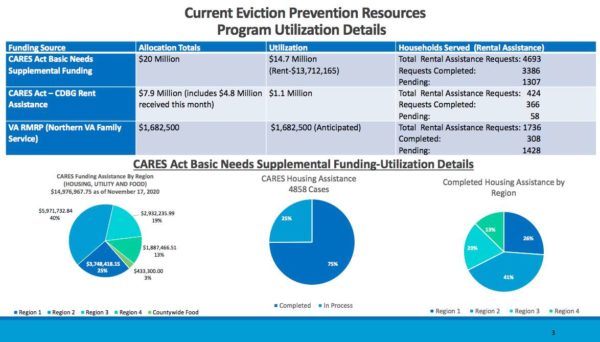About 250 more people are using Fairfax County’s emergency homelessness services this November over last November, and there are enough beds for just over half of them.
That number could increase as the federal ban on evictions draws nearer.
“As we look at potential rising eviction numbers, we need to be aware of the capacity for the homelessness system,” Fairfax County Health, Housing and Human Services Chief Strategist Dean Klein told the Board of Supervisors during a Health and Human Services committee meeting on Tuesday (Nov. 24).
With COVID-19 cases rising, Fairfax County is dealing with increasing numbers of people experiencing homelessness as well as the threat of rising eviction rates. Klein says rent assistance and partnerships with landlords will be critical for preventing evictions and keeping people in homes this winter.
“Our ongoing efforts to reach out to vulnerable populations is increasingly critical,” he said.
One step Fairfax County has taken is to form an eviction prevention task force with representatives from various county agencies, the county sheriff’s office, and the nonprofit law firm Legal Services of Northern Virginia.
Klein says he hopes to receive financial support from the Board of Supervisors next month. His staff anticipates spending at the same level as it is right now, which is about $600,000 a week.
Providence District Supervisor Dalia Palchik said a board matter is in the works that would “give additional local support for our continuation of basic needs, which we know continues to be a concern for us.”
Although funding comes from a number of sources, some are set to run dry soon, adding to the sense of urgency.
The Federal Emergency Management Agency stepped in this year to pay for hotel rooms so that people experiencing homelessness could have a place to sleep safely during the pandemic. However, it is unclear how long FEMA will continue to provide funding, Klein says.
Fairfax County Office to Prevent and End Homelessness Deputy Director Tom Barnett said the FEMA commitments are on a month-to-month basis and will last through the middle of December.
“We will continue to request extensions every month as they will support most of these expenses,” he said.
The U.S. Department of Housing and Urban Development has committed emergency-solutions grant funding to support shelter and rehousing efforts, but those funds “would be quickly used up if FEMA does not continue their support,” Barnett said.
Fairfax County also received more than $30 million in federal and state CARES Act funding and community development block grants to cover basic needs, including rent and mortgage assistance, on top of the $5 million that the county contributed.
“Not only do we need strategies and assistance to move through the end of the year, but we absolutely know this is not ending in 2020,” Palchik said. “Hopefully we will have more state and federal support to address the needs of our community.”
While some social support efforts tackle the challenge of sheltering people during the pandemic, others focus on preventing residents from ending up on the street in the first place.
In August, Klein’s office assigned social workers to 900 people in the legal system who are at-risk for evictions. So far, social workers have helped 300 people. Klein says the likely reason why so many did not respond is that the only way to reach this group of people was by mail.
The office is also beginning outreach to landlords, who might not receive rent payments from third parties. A $150,000 grant from the Kaiser Foundation has gone toward hiring people to work with landlords, but more outreach is needed, Klein says.
On the tenant side, Klein said his office developed guides that explain the current eviction moratorium and help tenants contact the organizations that provide rent payment assistance.
“With the numerous moratoriums, you can imagine how confusing it can be,” Klein said.
Dipti Pidikiti-Smith, the director of advocacy at Legal Services of Northern Virginia, says a number of new provisions protect tenants from being evicted.
Landlords cannot evict tenants unless they provide documentation of what they’re owed and information on available rental assistance programs. Landlords who own five or more units, or have at least 10% interest in five or more units, must offer a payment plan without late fees. Tenants cannot be evicted unless they refuse the plan.
These provisions remain in place through Dec. 31 and will be replaced by similar ones in January, Pidikiti-Smith said.








